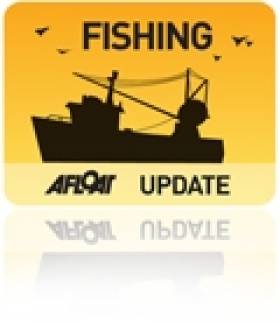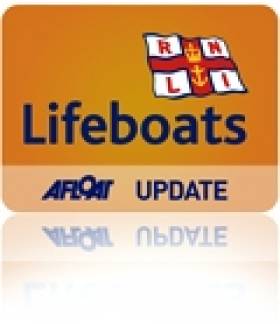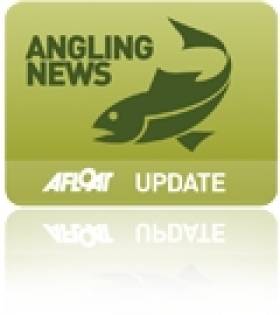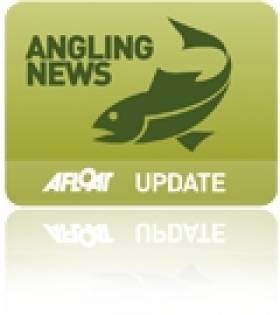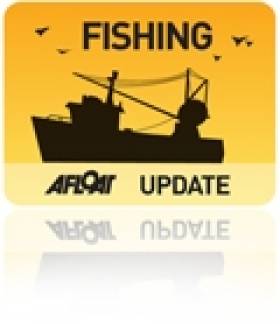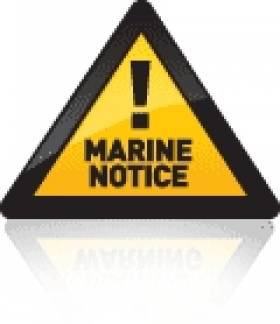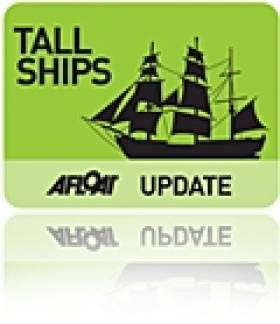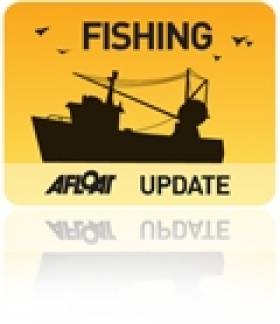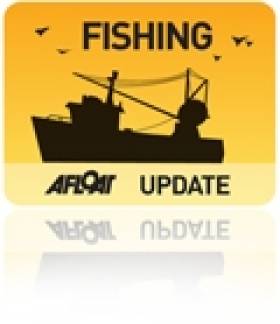Displaying items by tag: Fishing
State Of Irish Sea Salmon 'Rather Poor' Despite Industry Efforts
#Fishing - Salmon and cod numbers in the Irish Sea have continued to decline despite strict fishing and angling controls, according to BBC News.
The "rather poor" forecast for the important fish species comes from data collected by the Agri-Food and Biosciences Institute (AFBI) via its research vessel The Corystes, which sails the Irish Sea over 200 days a year and sets the standard for EU fishing quotas.
The AFBI's Walter Crozier said stocks had not "bounced back in the way that scientists expected. So we're now looking at other explanations because there isn't much more the fishing industry can do to reduce their catch of cod in the Irish Sea."
Such factors may include climate change causing a rise in sea temperatures, and increasing diversity of the marine ecosystem.
BBC News has much more on the story HERE.
Skerries Lifeboat Searches For 'Missing' Fisherman
#RNLI - Volunteers with Skerries RNLI launched their Atlantic 85 lifeboat Louis Simson shortly after 8.30pm on Tuesday evening (5 August) after a member of the public called Dublin Coast Guard regarding a man seen launching a small motor boat to go fishing that afternoon who had yet to return.
The lifeboat, with David Knight at the helm and crewed by Joe May, Eoin Grimes and Stephen Crowley, began an immediate search of the most popular local fishing spots, while other volunteer crew in the boathouse began to chart a potential search pattern.
A small motorboat matching the description given, with one man on board, was located just off the western shore of Church Island, off Skerries. The man required no assistance and indicated he was preparing to head for the North Co Dublin coastal town.
As the light was fading the lifeboat offered to stand by while he made his way safely to shore. At the time of the launch there was a Force 2 to 3 southerly wind and a calm sea.
Speaking after the callout, volunteer helm David Knight said: "Thankfully in this case the man was fine. However, the member of the public had genuine concerns and did the right thing in calling the coastguard."
Fish Kill on Dublin's River Tolka to be Investigated
#fishkill – Inland Fisheries Ireland and Dublin City Council are today (22.07.14) investigating an extensive fish kill on the River Tolka in Dublin City.
The latest indications are that the fish kill extends from an area in the vicinity of Finglas Road Bridge for a considerable distance downstream. The full extent of the kill has yet to be quantified.
Inland Fisheries Ireland and Dublin City Council are continuing their emergency response and associated investigations in an effort to establish the source of any contaminating material that may have caused this major pollution event.
Inland Fisheries Ireland (IFI) has a freefone number to enable members of the general public to report incidents - 1890 34 74 24 or 1890 FISH 24. This phone line is designed to encourage the reporting of incidents of illegal fishing, water pollution and invasive species.
Proposed Bye-Law To Extend Snap Net Season On River Nore
#Angling - A new bye-law is being proposed that would extend the current restricted season for the River Nore snap net fishery following the poor catch to date this summer.
The plans involve extending the season’s closing date from 24 July to 15 August (the normal closing date for the fishery) and allow fishing from Tuesday to Friday rather than the present Monday to Thursday.
The fishery is managed on a quota system which limits the number of fish which can be caught. All salmon and sea trout over 40cm caught by the snap net must be tagged with a white gill tag.
The full draft of the proposed bye-law is available to download HERE. Submissions can be made to IFI Clonmel by email at [email protected] or by post to Inland Fisheries Ireland, Anglesea Street, Clonmel, Co Tipperary. The closing date for receipt of submissions is 23 July 2014.
In other river fishing news, funding of more than €5,000 has been allocated to Carna Angling Club for a proposed project on the Carna River at Rusheenamanagh, Co Galway to improve the access for migrating fish into the river and introduce some new gravel to the spawning beds.
At present the returning fish can only access the river during a spate and high spring tide. The construction of a rubble mat at the base of the waterfall will allow the fish to migrate upstream twice daily during a spat.
At present the fish congregate below the falls and are vulnerable to poaching and predation. The rubble mat will be constructed from stone which is on site.
The project will also include the creation of small weirs and the introduction of gravel over a distance of 600m upstream from Lough Scannive.
Elsewhere, funds have been allocated to Rossnaree Fishery for proposed works at the Lower Boyne in Slane which will prevent further degradation of the spawning beds on this stretch of the river. The project will also prevent further bank trampling from livestock.
The total project cost is estimated at some €7,700. Funds of €3,171 have been allocated by Inland Fisheries Ireland, with the rest to be made up by own contributions.
Judge Convicts Men for Illegal Fishing Activities
#illegalfishing – Four men have been convicted of illegal fishing activities at two different sittings of Galway District Court on Tuesday, 1st July 2014. Judge Mary Fahy imposed fines and costs totally €4,900 to three brothers, Vidmantas Gaidys, Sigitas Gaidys and Alvydas Gaidys, convicted of illegal fishing activities; and John Costello was convicted of taking oysters illegally and fined €250, with costs of €300.
Illegal Fishing
Vidmantas Gaidys, of 21 Beal Srutha, Ballybane, Galway was convicted of using a net illegally, obstruction of fishery officers, and possession of a salmon in breach of fisheries legislation. Sigitas Gaidys, of 9C Bayview Rise, Ballybane, and Alvydas Gaidys, of Farm House, Cloonbiggen Road, Claregalway, were both convicted of the illegal use of a net, and obstruction of fishery officers.
Judge Fahy heard evidence that on the night of 19th October, 2013, the three men were in a van which fishery officers stopped close to the Clare River at Montiagh North, Claregalway, Co Galway. Vidmantas Gaidys was apprehended, while the other two men fled on foot. When the van was searched, two bags containing 78 coarse fish and 1 salmon were discovered. The other two men were later identified and interviewed. All three admitted to using a net, and pleaded guilty in court.
Judge Fahy warned that using the vehicle in the course of the offence was a serious matter, and she told Mr. Gaidys that if he came before her for a similar offence she would disqualify him from driving for two years. Vidmantas Gaidys was fined €1,500 with costs of €600, while the other two defendants were each fined €800, with €600 costs.
Illegal Oyster Fishing
At a second sitting of Galway District Court on the 1st of July, Judge Mary Fahy convicted John Costello, of Ballinacourty, Clarinbridge, Co. Galway, of taking oysters illegally from Clarinbridge Bay.
Judge Fahy heard evidence that on 5th December, 2013, Mr. Costello was observed by Fishery Officer Lonan O'Farrell hand picking oysters at Carrowmore, Ballinacourty, Co. Galway. The only legal method of harvesting wild oysters is by licensed dredge, and hand picking is strictly illegal. Mr. Costello left a bag at the shoreline, and when this was searched it was found to contain 94 wild native oysters.
Judge Fahy commented that the native oyster was under threat in many areas, and that it was very important to the local economy of the Clarinbridge area. She convicted Mr. Costello of a breach of Section 277 of the 1959 Fisheries Act, and imposed a fine of €250, with costs of €300.
Inland Fisheries Ireland (IFI) has a freefone number to enable members of the general public to report poaching incidents - 1890 34 74 24 or 1890 FISH 24. This phone line is designed to encourage the reporting of incidents of illegal fishing, water pollution and invasive species.
#MarineNotice - The latest Marine Notice from the Department of Transport, Tourism and Sport (DTTAS) advises that the International Maritime Organisation (IMO) General Assembly, at its recently concluded 28th session, adopted Resolution A. 1078(28) which revokes Resolution A. 600(15) to extend application of the voluntary IMO Ship Identification Number Scheme to fishing vessels of 100 gross tons and above.
The IMO Ship Identification Number Scheme was introduced in 1987 through adoption of Resolution A. 600(15), as a measure to prevent maritime fraud and enhance safety and security. The IMO number is used throughout the maritime industry as the first point of reference in identifying a ship.
Resolution A. 1078(28) will benefit oversight of the International Convention on Standards of Training, Certification, and Watchkeeping for Fishing Vessel Personnel, which sets the certification and minimum training requirements for crews of seagoing fishing vessels.
It will further aid implementation of the international treaty on fishing vessel safety, known as the Cape Town Agreement, once it enters into force.
Additionally, the proposed amendment will broadly facilitate improved management of fisheries-related maritime activities by other United Nations agencies and national governments.
IHS Maritime, formerly known as IHS-Fairplay (IHS-F), is the originating source for IMO numbers and is responsible for assigning and validating them.
The IMO request that owners and builders of existing and new fishing vessels of 100 GT or more obtain an IMO number, free of charge, at www.imonumbers.ihs.com. Alternatively requests can be sent to IHS Maritime by post.
Contact details and more information about the new resolution are included in Marine Notice No 37 of 2014, a PDF of which is available to read or download HERE.
Fisherman Dies Off Donegal Coast
#Inishowen - The Irish Times reports that a fisherman has died after his fishing vessel is thought to have sunk off Inishowen Head in Co Donegal this morning.
The alarm was raised by a local fisherman who spotted debris in the water, and the body of the mid-50s man was recovered by another boat some minutes later.
A subsequent coastguard search established that the man had been fishing alone in his 20ft vessel.
Maritime Ireland Deserves a Tall Ship
#tallship – You come across a reference to an island nation - the 20th largest in the world - that doesn't have a marine policy or a dedicated marine department, and you think it must be some kind of a joke. It's a ship of state without a captain, or a rudder. It adds insult to injury to discover that this same island nation was moved to the verge of bankruptcy after her inhabitants turned their backs on the ocean and invested too heavily in the land.
So much for living in a smart economy.
Not many people living in Ireland realise that it's the third biggest country in Europe, by virtue of her seabed territory of 220 million acres.
Ask any fisherman what EU membership did for our trawler fleet and you will get a quick answer. Ireland has two–thirds of European fishing waters and 3 per cent of the catch. That sell-out, as the fishing community saw it, was the beginning of the end of marine policy in Ireland.
We have in the past been able to blame a lot of our maritime ignorance on the British, with a little justification. Boat ownership by the 'native Irish' was restricted at times, and fishing permitted only by licence. But that was 400 years ago, so we're running out of excuses.
If you're searching for a recent symbol of this marine neglect, look no further than Asgard II. At 30 years old, the boat was at the end of her working life when she sank off the coast of France in 2008.
She was our maritime flagship, a national icon which had given 10,000 young people the chance to go to sea. The insurance money paid out and it went into central exchequer funds. The State showed no interest in replacing her. Until now perhaps?
There has been some sort of maritime awakening in official Ireland. In June, the Government hosted an Ocean Wealth conference declaring millions could be 'harnessed' from our seas in so many ways.
Separately, a new naval patrol vessel has arrived at a cost of E54m. Another one is expected next year. This month the Taoiseach announced he'd ordered a third.
Is it all coincidence or is Ireland moving towards a new marine game plan?
There's no doubting the public's interest in our seas.Just look at the interest in the maritime festivals around our coast this summer and the crowds that came to see Spain's 'Juan Sebastián de Elcano', the world's third largest Tall Ship in Dublin port in June.
Now there is fresh State impetus in the marine, there should in tandem be plans to replace Ireland's Tall Ship, a symbol of our maritime heritage and the possibilities offered in the seas that surround us.
A prosecution taken by Inland Fisheries Ireland (IFI) and the Director of Public Prosecutions for illegal netting of bass at Helvic, Dungarvan Bay, Co Waterford resulted in a conviction and heavy fine for a Dungarvan man at a recent sitting of the District Court in Dungarvan. Mr. Adrian Healey pleaded guilty to three charges under Statutory Instrument (S.I.) 230 of 2006 (Bass Conservation of Stocks Regulations) and two charges under the 1959 Fisheries Act as amended.
Mr. Tony O Dwyer, an Inspector with IFI, outlined to Judge Finn that six IFI officers were involved in what was an ongoing investigation following several reports of illegal netting of bass and sea trout at night, off the Waterford coast. IFI officers were observing the coast at Helvic in an attempt to find if illegal netting was occurring. Mr. Healy was found in possession of a boat, a 426 yard net, 11 bass, 9 pollack and one mackerel at Helvic pier at approximately 0300 hours on the 5th of September 2013. Mr. Healy was co-operative when approached by IFI officers who seized the net and bass. Solicitor Burke who represented Mr. Healy outlined mitigating factors explaining that Mr. Healy had a small fish dealer business, Abbeyside Seafoods, which he was trying to get off the ground at the time and that he was under pressure with a young family and made a mistake which he admitted to. Mr. Healy no longer has this business. Mr. Burke also highlighted that net fishing for bass was not illegal in other European jurisdictions and that Mr. Healy's net was also automatically forfeited following the conviction.
Having heard the evidence Judge Finn convicted Mr. Healy and imposed fines totalling €4,000.00 and awarded legal expenses of €674.89 to Inland Fisheries Ireland. The three counts under SI 230 of 2006 have a maximum fine of €5,000 each if heard in the District Court while the two counts under the Fisheries Act have a maximum penalty €2,000 each or 6 months imprisonment if heard in the District Court.
Net fishing for bass is illegal and such activity has the potential to do huge damage to stocks. Securing a conviction for illegal netting at night takes significant resources and dedication of staff and such night time activity is usually undertaken in an attempt to evade apprehension by fisheries officers. The sale of wild Irish bass is also illegal and it is important the public do not support illegal fishing by buying these fish.
#FishFarm - While the proposed Aran Islands fish farm remains in limbo after plans were halted by Brussels, The Irish Times reports that Bord Iascaigh Mhara (BIM) is to seek a licence for a second large-scale salmon aquaculture project off the Galway-Mayo coast.
The new scheme, to be located between the islands of Inishturk and Inishbofin, would be a third of the scope of the controversial 500-hectare proposal for Galway Bay, which still has the backing of BIM - though its future is unclear until at least later this summer.
According to The Fish Site, the latest proposal is the second of three announced by BIM in 2012, the third being an offshore site off Donegal that is still in the early planning stages.
As previously reported on Afloat.ie, the IFA argues that delays in the licencing of fish farm projects are hampering Ireland's ability to compete with Scotland and other organic salmon producers.
But any organic salmon farm scheme off the West Coast is likely to face strong opposition in the region, with the Galway Advertiser reporting that the recent local elections have filled Galway's city and county councils with a majority of members holding concerns about the impact of such developments.


























